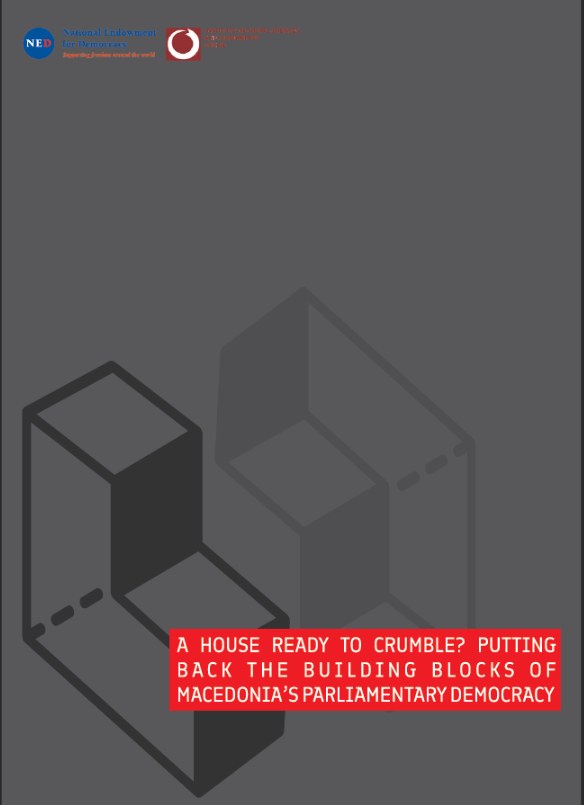
We kindly inform you that, as long as the subject affiliation of our 300.000+ articles is in progress, you might get unsufficient or no results on your third level or second level search. In this case, please broaden your search criteria.

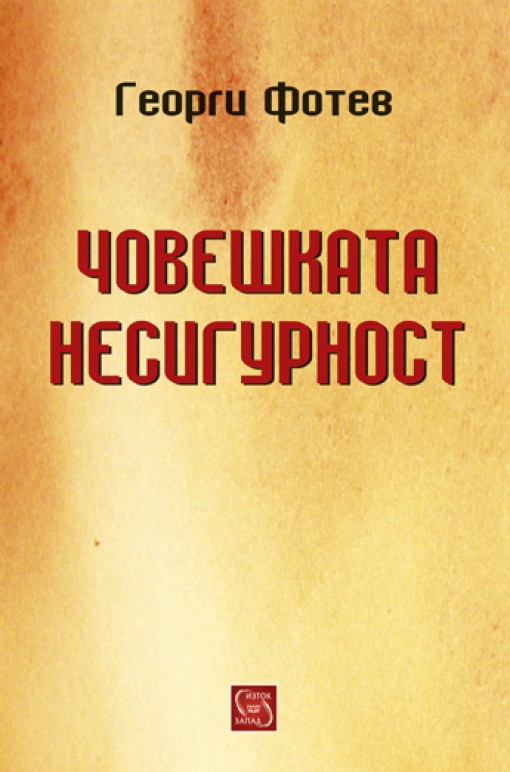
Prof. Georgy Fotev is a Bulgarian sociologist. His scientific works are in the areas of theory and history of sociology and the disciplinary fields of modern sociology. The focus of the research interests of G.Fotev is the nature of sociology as a multiple paradigm science. Another major theme in the works of Georgy Fotev is the dialogue as a base and horizon of multiple paradigm sociology. Georgy Fotev has publications in the fields of historical sociology, sociology of politics, ethnosociology, the crisis of legitimacy, sociology of values, etc. His books "The long night of communism in Bulgaria" and "Bulgarian melancholy" throw light on the dramatic fate of the Bulgarian national society. Georgy Fotev was Minister of Education and Science (1991 - 1992). He is professor emeritus of New Bulgarian University. In 2003 he was awarded the Distinguished Service Award from the American University in Bulgaria. Mankind is shaken by a multitude of uncertainty. There is an increasing perception that uncertainty becomes permanent. The focus is on the existential, social, political, economic, global and other basic varieties of human uncertainty. The author explores the fundamental conditions of human uncertainty and the main forms of her manifestation and experience. The phenomenon is seen in the light of the new science of chaos and complexity in the context of the risky society/world, in terms of catastrophic consciousness and the conditions of crisis types. Particular attention is paid to trust as a fundamental social attitude and condition against decadent attitudes and nihilism.
More...
U razvojnim tokovima srpske filozofske i teološke misli – kao i političke ili društvene misli – organska ili organicistička misao svakako nije neka nepoznata komponenta. Dok je srpska liberalna ili socijalistička misao – posebno kasnije marksistička misao – relativno dobro sistematizovana i proučena, organicistička misao je ostala na neki način po strani i reklo bi se da nije privukla pažnju kakvu nesumnjivo zaslužuje. Kada je već osamdesetih godina XX veka došlo do sloma mnogih idejnih tokova i političkih koncepata, zanimanje za srpsku organicističku misao ne samo da je poraslo već je ona doživela neku vrstu renesanse – barem njeni sledbenici tako kažu – i iznova je postala aktuelna. Verovatno je to bio razlog mnogih nesporazuma oko definisanja i redefinisanja te misli, posebno nesporazuma oko termina koji bi bili najprikladniji. Ta misao se u nekim slučajevima određuje u krugu filozofske misli kod Srba, u drugim pak, što je ispravnije, ona se izučava uporedo sa drugim tokovima misli. Uglavnom nedostaje njeno sistematičnije izučavanje, iako su neka istraživanja do sada dala solidne rezultate. Sve do danas, međutim, mogu se sresti neke definicije naglašeno ideološki intonirane, što naravno smeta u pokušajima njenog pravilnog definisanja. U drugim kulturama – kod Rusa i Francuza, posebno – tih problema, reklo bi se, nema. Kada E. Sioran određuje prirodu utemeljivača francuske organicističke misli, on svom radu daje podnaslov Esej o reakcionarnoj misli.
More...
Proceedings Ecofeminism: between women's and green studies, edited by Goran Đurđević and Suzana Marjanić (Durieux Publisher, Zagreb, 2020), consists of 40 texts from the humanities and social sciences (anthropology, journalism, political science, sociology, literary theory, science of education) and art (poetry and prose), written by 37 authors from Croatia, Australia, Bosnia and Herzegovina, Italy, North Macedonia, Serbia, Slovenia, the United Kingdom and the United States. The starting point for edited book was workshop cycle on the Faculty of Humanities and Social Sciences in Zagreb organized with help of professor Drago Roksandić and there was created idea for book by Mirjana Grabovac, Karmen Ratković and Suzana Marjanić. Also, various colleagues such as Dražen Tončić and Mirta Maslać from Durieux, artist Kristina Pongrac and reviewers Ivica Bakota, Zlatko Bukač and Ana Stojanović have been an important part of this volume. The aims of the collection are to actualize ecofeminism and encourage critical reflection and analysis of long-term ecofeminism in Croatia and Southeast Europe; permeation of global and local approaches and knowledge transfer; openness to young authors. For these reasons, the book can be read on several levels: theoretical as a contribution to the knowledge of the theory of ecofeminism in the context of contemporary trends, socio-political as an analysis of social processes and structures, activist through the analytical perspective of activism of individual groups and actors in public, performative and political life. The final part of the volume are poems and this piece of book shows a holistic approach to ecofeminism and integration of scholarship, essays and art which is leading back to the roots and indigenous perspectives of life and community understood as integration.
More...
Ovaj esej nudi socijalističku feminističku postkolonijalnu interpretaciju pojma antropocen kakav se koristi u novijoj ekokritici. U osporavanju krutoga pozicioniranja čovječanstva nad Prirodom, rad se oslanja na marksističku psihoanalitičku teoriju ne–identiteta Theodora Adorna (1973) i Julije Kristeve (1973, 1977, 1978). Donoseći ekofeministički doprinos novom području ekoloških humanističkih znanosti, kritički se bavi perspektivom istaknutog američkog znanstvenika Timothyja Mortona (2012). Uz to, sugerira se da socijalistička feministička postkolonijalna politika ekofeminizma dovodi u pitanje neizbježnu univerzalnost antropocena, gradeći Zemljinu demokraciju (Earth Democracy) epistemologijama skrbi (epistemologies of care). Zaključeno je da razumijevanje pojma antropocen, fenomena koji je duboko rodan, zahtijeva više od razmišljanja u »dubinskom geološkom vremenu« (deep geological time). U konačnici, svaka ekološka svijest zahtijevat će sposobnost razmišljanja u »dubinskom libidinalnom vremenu« (deep libidinal time).
More...
Although the »women’s issue« has been founded as a political issue several decades ago, along with the development of »new wave« feminism, or neo–feminism, that brought to changes in the approach within the whole series of social issues, only with the emergence of »the green movement« and forwarding of »green« issues as political »women issues« as well as environmental issues, have they assumed a new importance within ecofeminist alternative groups. Ecofeminism encompasses different approaches, from liberal to ecocentric ecofeminism groups. In the course of numerous discussions between ecofeminist and feminist groups and their standpoint, there are also other intrinsic environmental groups and their standpoints, from which most prominent group representing deep ecology viewpoints, with which ecofeminist orientations are frequently in disagreement. Regardless of, however, certain disagreements within certain ecofeminist groups and their approaches, some of which are even useless or derogatory for (eco)feminism, as well as conflicts with the deep ecology, from the standpoint of social ecology it is important to take into account and take into the consideration all these (eco) )feminist standpoints, because they direct us to the situation where we should move beyond faulty dualism of the opinion model that characterizes West social and philosophical tradition, and towards which women are inferior to men, nature towards culture, emotions towards reason and body towards mind, under the condition that we want to achieve environmentally harmonious living, integrating nature with culture into an organic eco–cultural whole.
More...
The first philosopher Hypathia and her tragic death are less well known, and the Minoan Age of Crete Island management represents an egalitarian society in which women are equal to men. The eco– feminist movement was founded during radical and turbulent social changes in the early eighties. Due to the effects of wars, global environmental movements and minority rights movements have joined forces to create a significant subversion of patriarchal–based theory. The author and environmental pragmatist, leading sociologist Jane Adams, winner of the Nobel Prize, who received her doctoral degree at Yale University and organized the Hull House project to investigate the behavior of immigrants, influenced the eco feminist pragmatism of Charlotte P. Gilman and Caroline Bartlett Crane. This position is later found in the works of well–known neo eco feminists and sociologists. It is necessary to implement deconstruction and demystification of patriarchal approaches to society and education, in order to form a contemporary sociological theory, involving women as authors and their achievements.
More...
In this paper, I will approach the celebrated masterpiece of nineteenth century American literature — Melville’s Moby Dick using the critical concepts developed by feminist and vegetarian critics within ecofeminist theory. Thus, we will first look at the cultural production of the texts of meat, which are developed by emptying out of animal subjectivity and treating animals as referents absent from the sphere of human morality. Next, we will look at the background of the Nantucket society and whale fishing industry, and its role in strengthening the texts of meat embodied in whaling. Also, the romanticizing of violence and myth making connecting the whale men with the hunters and pioneers venerated in the myth of the American frontier are then examined. The factory function of the whale ship is analyzed in terms of industrialization encroaching upon the world of nature, and of treatment of animals as consumable commodities. Lastly, the concept of »Manifest Destiny« is read through the spectacles of extinction of whales and other species.
More...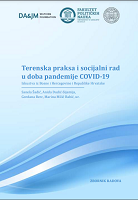
U Federaciji Bosne i Hercegovine od 2015. godine u primjeni je Zakon o zaštiti i postupanju sa djecom i maloljetnicima u krivičnom postupku FBiH19. Zakon predstavlja strateški zaokret i donosi određene novine u oblasti maloljetničkog prijestupništva. Temelji se na rješenjima savremenog krivičnog zakonodavstva, međunarodnim standardima i iskustvima dobre prakse drugih zemalja. Zakonom se utvrđuju posebna pravila postupanja prema djeci koja su u sukobu sa zakonom, mlađim punoljetnim osobama i djeci koja su žrtve ili svjedoci, pri tome poštujući najbolji interes djeteta te omogućavajući da dijete, u skladu sa uzrastom, iskaže svoje interese. Njegova primjena u praksi zahtijeva pravovremenu reakciju i osposobljavanje svih nadležnih organa, prvenstveno stručnih osoba organa starateljstva, odnosno centra za socijalni rad.
More...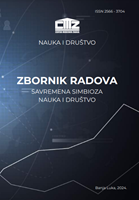
Znaĉaj nauke za ĉovjeka i ljudsko društvo vrlo je velik. Nauka je naĉin spoznaje svijeta. A svijet u kojem mi ţivimo je veoma ovisan o nauci i tehnologiji. Da bismo bolje navigirali ovim svijetom, potrebno je da znamo ponešto o osnovnim nauĉnim fenomenima – kako stvari rade, kako se nešto dešava i kako funkcionira naš organizam. Zato ulaganje u nauku i obrazovanje, a samim tim i u ljudske resurse, donosi veliku korist za pojedince i društvo u cjelini. Pojedinci i društvene grupe zauzimaju odreĊeno mjesto u društvu na osnovu znanja kojim raspolaţu. Ono unapreĊuje sve oblasti ĉovjekovog ţivota i djelovanja. Društvo i nauka su ĉvrsto vezani i nalaze se u meĊusobnom odnosu. Društvo je stvaralo uslove i davalo društveni ambijent u kome se nauka mogla razvijati. S druge strane, nauka je omogućavala brţi razvoj pojedinih društvenih oblasti i cijelog društva. Povoljni društveni uslovi uticali su na nastanak brojnih izuma, patenata, tehniĉkih rješenja i modernizacija. Razvoj informatike dodatno je ubrzao razvoj i povezivanje preduzeća, multinacionalnih kompanija, drţava regija i svijeta. Povećana je razmjena ljudi, dobara, proizvoda i usluga. Ĉetvrta industrijska revolucija otvorila je neslućene mogućnosti razvoja i dalje promjene društva, društvenih odnosa. Sve ove promjene utiĉu pozitivno i na razvoj cjelokupnog društva, ali i demokratije i ljudskih prava. Sve ovo govori o jednoj simbiozi koja je rezultirala da nauka i društvo postanu jedna savremena forma ljudskog ţivora i razvoja civilizacije u XXI vijeku. Zbornik radova pod naslovom „SAVREMENA SIMBIOZA - NAUKA I DRUŠTVO“ je publikacija nauĉnih radova u okviru nauĉnog skupa „Nauka i društvo“. Ova publikacija predstavlja nauĉne i struĉne radove već dokazanih nauĉnih radnika i istraţivaĉa, ali i onih koji su na poĉetku svog nauĉnog rada. U Zborniku su objavljeni radovi nauĉnih radnika iz Bosne i Hercegovine i Republike Srbije, koji su u skladu sa njihovim nauĉnim iskustvom, uz dobronamjerne recenzije, usklaĊeni i adekvatno kategorisani. S obzirom na multidisciplinarnost teme zbornik obuhvata radove iz raznih nauĉnih disciplina kao što su: ekonomija, pravo, bezbjednost, defektologija, politiĉke nauke, sociologija i pedagogija. Radovi su aktuelni i obraĊuju savremena društvena pitanja i probleme, ali i teorijska i praktiĉna dostignuća pojedinih nauĉnih disciplina. Na takav naĉin dajemo podsticaja svim mladim ljudima da kroz svoj nauĉni rad daju doprinos u rješavanju brojnih društvenih problema. Upravo i prilikom izbora tekstova ureĊivaĉki odbor je ţelio da takvi radovi budu prioritetni u ovom zborniku, te je i sam naziv istog proistekao iz te ideje i potrebe. Nauĉni radnici, posebno oni koji su na poĉetku svoje akademske karijere, trebaju podršku kako bi istrajali u svom usavršavanju i nauĉnom dokazivanju. Ovaj Zbornik, kao i sam nauĉni skup, nastao je iz entuzijazma nekolicine profesora okupljenih oko Centra modernih znanja, da kroz ovakav vid nauĉnog rada otvore vrata nauke svim mladim nauĉnim radnicima i istraţivaĉima kako bi i njihova empirijska istraţivanja i dobijeni rezultati bili prezentovani široj javnosti. TakoĊe, dosadašnja saradnja sa kolegama iz Beograda i Nikšića rezultirala je da izdavaĉi ovog zbornika budu tri udruţenja iz regiona koja već duţi vremenski period saraĊuju organizujući razne edukacije. Brojni radovi otvaraju razne dileme i ostavljaju mjesta diskusiji kako i na koji naĉin nastaviti i razvijati razne nauĉne discipline. S tim u vezi ostavljamo vam prostora, da i vi svojim sugestijama i razmišljanjima, zajedno sa autorima traţite efikasnija rješenja i mogućnosti. Ovaj Zbornik nije konaĉan, jer nauka svaki dan traga za neĉim novim pa tako i autori i ureĊivaĉki tim ove publikacije.
More...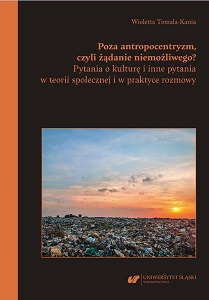
The book Beyond Anthropocentrism, i.e. Demand for the Impossible? The Questions of Culture and Other Questions in Social Theory and Practice of Conversation concentrates on man and his psycho-physical condition, taking special account to its ethical consequences for the world and himself. However, the book also tries to make him leave his privileged status. The monograph is divided into three parts. Chapter 1: Culture in Theory presents essential findings focused on the key term, “culture”. Chapter 2: Culture in Practice presents seven in-depth interviews conducted in the years 2020–2021 with the researchers representing a spectrum of different scientific disciplines: Ewa Bińczyk, Katarzyna Dembicz, Bogumiła Lisocka-Jaegermann, Joanna Ostrowska, Hanna Rubinkowska-Anioł, Jolanta Sujecka, Anna Ziębińska-Witek. In Conclusion, the fundamental problem of the posthumanistic (non-anthropocentric) vision of the world is paid attention to.
More...
Drawing on episodes from the historical development of the relationship between economics and sociology, and using assessments of the current state of the two disciplines, the report identifies politically motivated interventions in their interaction. The interventions began with the introduction of a boundary between the two disciplines in the first half of the 20th century and continued to maintain the boundary to this day. The consequences for the two disciplines of their continued separation and the mechanisms of influence through which it is maintained are discussed.
More...
The path of growth of economic sociology is presented under the resulting impact of the integration of the knowledge of the two sciences in a theoretical and empirical aspect according to their needs. Thus, economic sociology grows as a stimulator and environment for studying the interacting countries. It is pointed out that historically this process begins from the beginning of the introduction of sociology in our country and that it leads to the modern growth of economic sociology, promotes the penetration of both systems in favor of the effectiveness of management activities for the growth of the country.
More...
The path of growth of economic sociology is presented under the resulting impact of the integration of the knowledge of the two sciences in a theoretical and empirical aspect according to their needs. Thus, economic sociology grows as a stimulator and environment for studying the interacting countries. It is pointed out that historically this process begins from the beginning of the introduction of sociology in our country and that it leads to the modern growth of economic sociology, promotes the penetration of both systems in favor of the effectiveness of management activities for the growth of the country.The world is changing socially, economically, environmentally, politically and demographically. The changes span societal and political systems. Economic and medical crises have accelerated social and economic transformations. These trends and processes are accelerated and multiplied by the dynamism and intensity of the development of new technologies and artificial intelligence. This creates an acute need for relevant and interdisciplinary research to suggest ways to manage social change and better understand the new social mechanisms for the functioning of communities at all levels - global, regional, national, and local. The study of new societal systems and relations, including behavioral patterns, as related to contemporary social science research fields. In this regard, the basic aim of the study is to outline and analyze the challenges and new contours of research from contemporary sociological science. The author uses a set of approaches and methods such as descriptive, analysis and synthesis, reference to expert opinion, analysis of scientific literature, induction, and deduction.
More...
The article analyzes the theoretical and intellectual context o f W.E.B. Du Bois‘s project for visualizing quantitative data, with a focus on his participation in the „Exposition o f American Negroes“ at the 1900 Paris Exposition. Since Du Bois‘s work is not widely known in Bulgaria, the article also addresses some o f its key aspects. The main thesis is that Du Bois‘s data visualization project should be understood both in the context o f his economic sociology and through what he calls „double consciousness“. Through this concept, Du Bois‘s work can be viewed as a sociological examination o f the „psychological“ barriers to the political applicability o f scientific research. His attempts at data visualization should be read as a civic response to this issue.The article analyzes the theoretical and intellectual context of W.E.B. Du Bois‘s project for visualizing quantitative data, with a focus on his participation in the „Exposition of American Negroes“ at the 1900 Paris Exposition. Since Du Bois‘s work is not widely known in Bulgaria, the article also addresses some of its key aspects. The main thesis is that Du Bois‘s data visualization project should be understood both in the context of his economic sociology and through what he calls „double consciousness“. Through this concept, Du Bois‘s work can be viewed as a sociological examination of the „psychological“ barriers to the political applicability of scientific research. His attempts at data visualization should be read as a civic response to this issue.
More...
In the era of Marketing 5.0, digital technologies and social dynamics are intertwined, creating new challenges and opportunities for business and society. Internet sociology studies the impact of online communication, social networks and digital platforms on consumer behaviour, trend formation and brand building. This study examines how social interactions in digital environments are transforming marketing strategies, focusing on personalization, artificial intelligence, and the ethical aspects of digital advertising. Key issues such as the penetration of the metaverse into everyday life, work, and education are analyzed, shaping the future of digitization. The paper highlights the importance of internet sociology as a tool for understanding new patterns of consumer behaviour and creating effective marketing strategies in a dynamic digital society.
More...